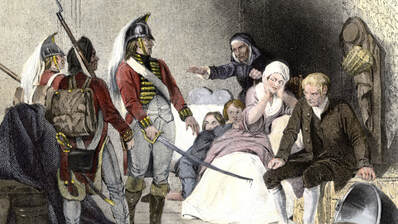
With the expansion of European colonies in the America's the need for large standing armies to defend against both native attacks and belligerent rival states, quartering in peacetime became more common. Initially, the Quartering Act of 1765 applied only to commercial establishment, such as inns and taverns, and the expenses for quartering troops were to be paid by the colonial government. This practice was actually popular with the innkeepers and tavernkeepers, who were provided with regular payment, but less so with the colonial administrators who had to find the funds to make these payments.
The Quartering Act of 1774 was enacted in response to the failure of the local legislatures to provided the needed funds and allowed the royal governor of each of the British Colonies to quarter troops without assent of the owner of the property or with compensation unless such was provided by the legislature. In principle, the Act was limited to quartering troops in unoccupied buildings, but in practice this rule was not always observed, though the quartering of troops with colonial families was far less widespread that is often portrayed. Rather, many of the soldiers, typically officers, who lived in colonial homes were boarders who paid for the accommodations from their own resources or from a stipend paid by the army.
What the colonists found to he "intolerable" about the Quartering Act of 1774 was that it bypassed the traditional role of the legislature in controlling its expenditures. Furthermore, involuntary quartering had been outlawed in Britain as early as 1723 as part of the Mutiny Acts addressed to military discipline, but the British Army did not recognize the Munity Acts as applying in colonial possessions.
Quartering of troops illegally was one of the grievances stated against King George III in the Declaration of Independence and was the subject on the 3rd Amendment to the Constitution. Although quartering of troops is no longer a common practice in modern armies, the principles of the limits on executive power implied by the 3rd Amendment have been cited in several Supreme Court opinions. More recently, the amendment has become the focus of debate over the power of the federal government to requisition property during national emergencies.
 RSS Feed
RSS Feed